In 2007, I packed up a (large and over-flowing) bag, hopped on a plane, and moved to Amman, Jordan for my junior year of college abroad. It was, for about a thousand reasons, a year that completely changed my life.
Anyone who has spent a day with me—maybe even just an hour—will acknowledge that I talk about my time in Jordan pretty often. I can’t help it. Jordan is one of those places that just sticks with you. It creeps into your mind at odd moments. It leaves you reflexively saying “One time, when I was in Jordan…” to anyone who will listen.
So it is that I also often find myself encouraging people to travel there. “If you ever get the chance,” I say, “Go. Just go. You won’t regret it.”
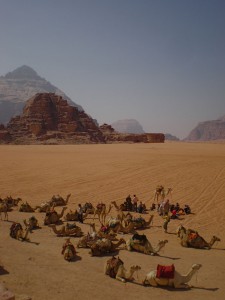
But lately it’s been harder to get people excited about it. Travelers are apprehensive. They throw news headlines at me like they’re reading them directly from the TV screen. “But what about all the ‘Unrest in the Middle East’? And the ‘Arab Spring’?” They say. “I’d love to go to Jordan–but now?? It just doesn’t seem safe.”
I started to hear some variation of this so many times that even I began to doubt myself. It has been over three years since I left Jordan in 2008, after all. So, I went to a basic and reliable source: The U.S. Department of State travel site.
As of July 2011, there are no travel warnings issued specifically for Jordan. In fact, there hasn’t been a travel warning for Jordan issued at all this year, even during the height of the Egyptian uprising, and the current deadly protests in Syria. The site does state, however, that the “threat of terrorism remains high in Jordan.” Still, it also recognizes on every other country-specific page that travelers should remain “vigilant” in the face of “an increased threat of terrorist incidents” worldwide. If terrorism is what’s keeping you from traveling, you might be better off not going anywhere right now.
Still, having been away from Jordan for so long, I wanted to know what it was actually like “on the ground,” away from governmental jargon and news reports. So I turned to three trusted sources. First, Reine Gammoh, the Media and Communications officer for the Jordan Tourism Board in Amman, who deals with foreign travelers in Jordan daily. Second, Dr. Allison Hodgkins, the Resident Director of CIEE in Amman, an American who has lived in Jordan for five years, and who’s job it is to keep over 100 American college students safe in the Middle East every year. This woman knows her stuff about travel and safety in the region—believe me. Finally, Daniel Noll, half of the married pair (along with Audrey Scott) that makes up Uncornered Market, an expert traveling duo that recently explored Jordan despite the political unrest in the area.
With their help, I’ve compiled a list of five reasons you should absolutely go to Jordan. Now.
It is safe.
Yes, there are random encounters that may happen in Jordan that are dangerous–there’s no way you can guarantee safety all of the time—but that’s life, not a country.
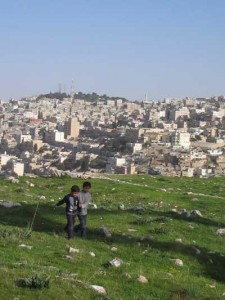
“We felt completely safe and welcome while traveling in Jordan,” said Daniel Noll of his recent trip there. “We’d take our parents there, and we like our parents. The point here is that just because there’s political unrest in the neighborhood does not mean that every country is unsafe. I’d also argue that “political unrest” is in the eye of the beholder. Our friends living in Amman laughed at media coverage that zoomed in on a handful of protesters to make it look like a mob.”
“It is a stable oasis of peace in the region,” Reine Gammoh, from the Jordan Tourism Board agreed. “During this whole turbulent time since the start of the year, we never had any problems with safety, especially with tourists.”
Dr. Allison Hodgkins—who, remember, keeps her eye on dozens of American college students at a time in Jordan—pointed out that safety is often dependent on your mindset as well. “If you come here to live and learn and are willing to exercise a modicum of self-restraint and common sense, then it is ridiculously safe.”
Jordan isn’t party central, and it’s a different culture with different social norms, but even then, it’s pretty easy to figure out. Common sense is what generally keeps you safe anywhere, at any time.
To begin to understand the Middle East, the news, and why the Middle East is not all one country.
At a time when the Middle East is constantly in the headlines (and often grouped as one general area), it can only help to have a basic geographical, cultural, and historical understanding—which is something you can count on getting when you travel, if you’re open to it. Beyond that, actually going to Jordan might help you understand how rich individual cultures are within the region, and how different Jordan is from, say, Syria or Egypt, even though they look so close on a map.

Politically, Jordan is very unique from its neighboring countries facing troubles right now. “Jordan remains a ‘sensible little country’ that has tackled the reform wave head on,” points out Dr. Allison Hodgkins. “There will be change in Jordan, but moderated and managed. No one in Jordan wants to see the kind of instability and turmoil that has impacted other countries. Consistently, Jordanians from all camps have demonstrated a willingness to pull back from the brink and pursue a course that keeps the issues at the forefront but stops at damaging the stability and security.”
In short, Jordan won’t be going down the same path as Egypt or Syria any time soon. But it’s still culturally and geographically relevant to the headlines, and it’s a safe place to begin to understand a part of the world that is often misrepresented and misunderstood.
Eco-tourism like you have never seen it before.
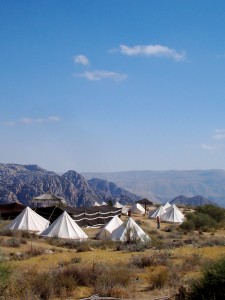
With safety and politics aside, what do you do in Jordan?? Amman is a great city, and well worth a visit; It’s also a great place to live and have as home base while you explore the rest of the country. Personally, though, I was continuously blown away by the eco-tourism available, especially when I only pictured desert a la Lawrence of Arabia before I got to Jordan.
In the year I was there, I spent multiple days at the lowest point on Earth (the Dead Sea), relaxed in hot springs, sprawled on a sun-soaked beach on the Red Sea, belayed down waterfalls, hiked through canyons, slept in a solar powered eco-lodge, and camped on sand dunes—and that was all on my calculated student budget. One can only imagine what you could do there with a couple extra dollars in your pocket.
There’s also the number of historical sites to see, with Roman ruins and crusader castles popping up throughout the country, as well as Petra, understandably one of the New Seven Wonders of the World. “Jordan is a relatively small country,” Daniel Noll told me after traveling there, “but there’s a surprising amount of ground to cover.”
Get it while it’s still cheap.
Jordan has been hard at work attracting tourists in the last few years, with its “Visit Jordan” logo appearing in different marketing campaigns worldwide in the last decade. “We have seen a steady increase of travelers to Jordan in the past few years,” said Reine Gammoh of the Jordan Tourism Board, “and numbers increase from year to year.”
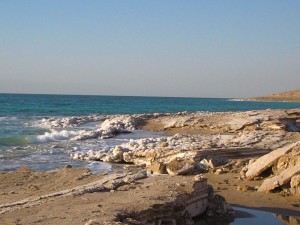
2010 was Jordan’s best tourism year to date–the number of tourists increased by 23.4% as compared to 2009, even in the threat of the global economic crisis that saw a decrease in tourism worldwide. That’s probably partially because Jordan isn’t going to break your bank account; it’s a developing nation, after all. Still, Jordan is recognizing tourism as one of its largest (and only) exports these days, with four-star hotels and resorts popping up fast in the most popular locations, and tour buses becoming an every day sight in the streets. Starbucks and shopping malls are prevalent in parts of Amman (there’s even a Forever 21 at a huge shopping complex called Mecca Mall), and “Western” comforts for foreigners aren’t hard to find if you want them.
Along with that, though, comes price inflation, and as Jordan becomes more widespread as a global tourist destination, prices will go up and sites will get crowded.
The people.
One thing travelers to Jordan frequently comment on after visiting is the hospitality they experienced from the people they met while there, whether they were strangers on the street or shopkeepers or old friends. It is deeply rooted in Jordanian culture (along with many other countries in the Middle East) to treat guests with the utmost respect and care.
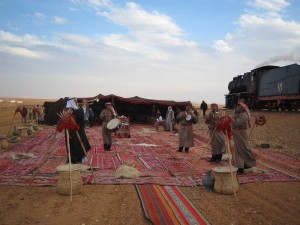
“The Bedouin culture in Jordan takes the concept of guests (and tourists are considered guests) very seriously,” said Daniel Noll. “As hosts, they feel responsible for you. If anything were to happen in Jordan, we felt confident that local people would help take care of us and be concerned with our safety.” (To read more about Daniel’s impressions of the Bedouin in Jordan, go here).
It’s true. Living there for a year, I understandably found myself in occasional times of distress, whether I was lost or unable to communicate or needed advice. I was rarely without a helping hand. The culture of hospitality in Jordan (as well as much of Middle East) is such that you shouldn’t necessarily be surprised if you find yourself invited to a new friend’s house for dinner with his or her family, or sitting down to tea with a shopkeeper you just met. In a society based on community and family, that’s just the way it is, especially with guests. Petty crime and random violence are unusual, but if anything were to happen to you while you were there—as things sometimes do when traveling—you can be sure people would be ready and willing to offer whatever help they could.
Bottom line: Jordan is worth a visit, and now. As always, being a well-informed and responsible traveler is important. Register with the Smart Traveler Enrollment Program with the U.S. Department of State before you go to make sure that the embassy knows how to contact you if need be. Also, check out the U.S. Department of State Jordan travel site for basic travel advice. Learn a little Arabic. Know how to act and dress respectfully.
But most of all, go with an open mind and get ready to experience a place that, like I said, sticks with you. “Given everything that Jordan has to cope with: limited resources, struggling economy, raucous neighborhood, etc, what this country has achieved is really remarkable,” Dr. Allison Hodgkins pointed out recently. “It’s a shame more people don’t come to experience it!”
 For a list of guided tours offered throughout Jordan, visit the Jordan Tourism Board’s list of recommended tour operators here.
For a list of guided tours offered throughout Jordan, visit the Jordan Tourism Board’s list of recommended tour operators here.

